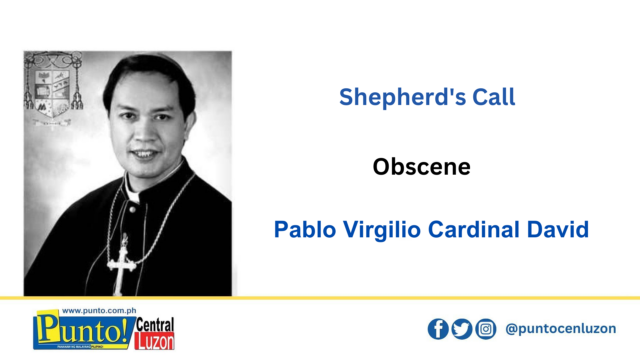THIS MORNING, I read the column of veteran journalist Ceres Doyo in the Philippine Daily Inquirer. Its title was: “Sickening Display of Wealth Porn.” How do we translate that into Tagalog? Perhaps: Nakakasukang Paglalantad ng Mahalay na Karangyaan. Forgive me, but I cannot think of a better Tagalog equivalent for porn than mahalay. My vocabulary is limited.
In her column, Ceres Doyo referred to the controversial interview conducted by two fellow journalists with a contractor couple who brazenly flaunted their mansion and the massive garage housing forty luxury cars, which they claimed came from their DPWH contracts.
In Tagalog we use the word mahalay (obscene) when people expose in public what is meant to be hidden—the private parts of the body or private acts in the bedroom. It is obscene when what should be shameful is shamelessly flaunted, when what ought to be hidden is displayed with pride. It is obscene when sudden wealth from corruption is paraded as a model of success, when ill-gotten gain is celebrated as “cleverness.” It is obscene when the children of politicians post on social media a dinner bill amounting to ₱760,000 for just four people—an amount that even a worker cannot earn in three years. Is it not obscene to indulge like this while most of our people struggle daily to feed their families despite back-breaking work for meager wages?
It is obscene when a poor father of six is arrested and jailed for allegedly tossing coins in a street-side game of “cara y cruz,” while no one is arrested, jailed, or charged for squandering billions of pesos of public funds on ghost flood-control projects. It is even more obscene that online gambling is now legal and accessible on every cellphone 24/7, with the government itself acting as gambling lord. It is obscene when killing itself is glorified, and when lawmakers and law enforcers themselves trample on the very laws they are supposed to uphold.
I believe this is precisely what St. Mark wants us to see in today’s Gospel on the martyrdom of John the Baptist. Where else do you find a birthday party in which a drunken governor, entertained by the dance of his mistress’s daughter, promises her “up to half of his kingdom”—which was not even his? Where else do you find a banquet where the centerpiece is the severed head of a prophet on a platter, served as a reward for a lustful dance performed at the bidding of a scheming mother? Let us call this what it is: power porn—an obscene display of power. Even worse, the people do not recoil in disgust but clap, laugh, and cheer, entertained by the masked executioners.
At least the executioners still had a shred of shame—they covered their faces before decapitating the prophet. But the obscene death of John the Baptist would soon be followed by an even more unspeakable and horrifying murder: that of the Son of God. A grotesque spectacle—stripped naked, beaten and bloodied, crowned with thorns, crucified like a common criminal, mocked and tormented, offered cheap sour wine on a sponge tied to a stick used by soldiers as toilet paper.
We must allow ourselves to be shocked and sickened by such obscenity so that we may be shaken awake, so that we may recover our sense of dignity, decency, and humanity in a society corroded by corruption.
(Homily for Aug. 29, 2025, Friday of the 21st Week in Ordinary Time
Feast of the Passion of St. John the Baptist, Mark 6:17–29)





